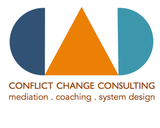Remember that this process is for the client. It is not adversarial. There are no winners or losers. This is not the time for grandstanding. Your role is that of trusted advisor. It is perhaps one of the earliest and most rewarding roles a lawyer can have.
Encourage
How can you support your clients? Encourage them to speak. Many clients are intimidated by legal proceedings, but mediation has an informality that should empower the client to speak for himself or herself. There are many benefits to having the client speak directly, such as encouraging communication and impact. Direct communication is something that is often lost in conflict. Parties either cease communicating as they hurl abuse, or they employ proxies to communicate on their behalf. This lack of direct communication can hinder the chances of reaching resolution. Sometimes people need to hear the words from the other person.
Advise
As part of the mediation process, your client will need to consider options, which are presented either by the mediator or the other side. Your role is to help consider the reasonableness of any suggestions. In mediation, the goal is a durable solution. This means a solution that meets the needs of the parties, which they can honour. Your help in assessing information and offers and then preparing options is invaluable to your client.
Draft
If the options translate into a settlement then you will need to prepare the settlement agreement usually with the help of the other side’s lawyer. Make sure you take the time to understand the offer and also your client’s expectations of the offer. When you draft, draft carefully.
Speak up!
Speak up! If there is something happening during the mediation that is of concern then speak up and let the mediator know. It could be concern about the safety of your client or it may be the attitude of the mediator. It can be very difficult for parties who are immersed in their dispute to raise these issues. If you are concerned about the mediator, there may be logical reason why they have done something but it is important for the parties to have absolute confidence in the process so ask.
Aftermath
Although mediations typically result in a settlement, you should be prepared for what happens if there is no settlement. Bear in mind where the case is in the litigation process. If you are convinced that the other side is mediating in bad faith then you may need to help your client by advising them in respect of disclosures. If the other side views the mediation as a fishing expedition, then you do not want to provide them with information, which they may try and acquire in subsequent proceedings. Mediation is confidential, but if your client shares information it may provide the other side with fresh ideas about where to look.
No egos
The last one is hard for lawyers to hear and only applies to some, but leave your ego outside the session. This process is for your client as they will live with the consequences of the mediation, whether that is a settlement or continued conflict. I have been in mediations where the lawyer was so fixated on ‘beating the other side’ that they forgot to let their client make a decision about settlement. You may be the most articulate person in the room with the best understanding about the issues but this is not about you. Help your client by approaching the mediation with your skills as an advisor honed to perfection and your professional pride left at the door.

